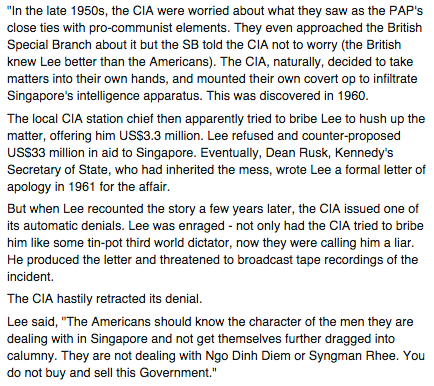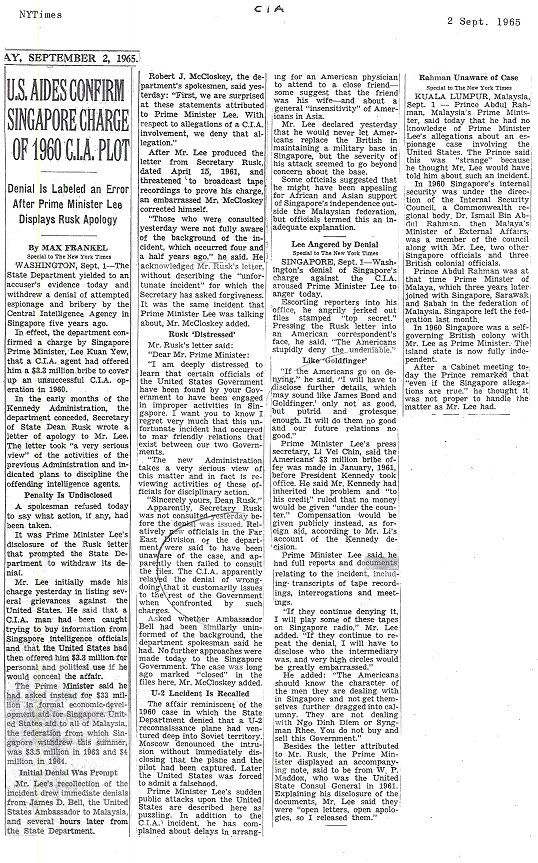In 1959, the Central Intelligence Agency (CIA) had suspicions of the People’s Action Party (PAP)’s close ties with what they saw as pro-communist elements, and launched an intelligence operation in Singapore to find out. In 1960, Lee discovered their covert operation and the CIA responded with a US$3.3 million bribe so that Lee would keep mum.
Lee refused and asked for US$33 million in economic-development aid to Singapore and Malaysia instead.
He was haggling when he could have simply accepted the bribe and been US$3.3 million richer. What he did instead was to use his advantageous position for the betterment of the nation.
The United States instead gave Malaysia US$3.5 million in 1963 and US$1 million in 1964. Singapore was still part of Malaysia then.
When Lee recounted the incident, CIA immediately denied all of the bribery allegations until Lee, in a fit of anger at their denial, produced top secret letters from the CIA addressed to him and threatened to produce tape recordings of the bribery act.
The CIA retracted their denials, and Lee was sent a formal letter of apology written by then-Secretary of State Dean Rusk.
What a boss.


[From 9 Dec 2019, Washington Post Powerpost (email news summary):
The Afghanistan Papers show the corrosive consequences of letting corruption go unchecked
Exclusive: A secret history of the war in Afghanistan, revealed
BY JAMES HOHMANNwith Mariana Alfaro
THE BIG IDEA: A toxic mix of U.S. government policies, under the administrations of George W. Bush and Barack Obama, directly contributed to Afghanistan’s descent into one of the world’s most corrupt countries.
U.S. leaders said publicly that they had no tolerance for corruption in Afghanistan, but that was one of several topics related to the war effort on which they systematically misled the public, according to a trove of confidential government interviews obtained by The Washington Post.
American representatives often looked the other way at egregious and brazen graft, so long as the offenders were considered allies. Congress appropriated vast sums of money, which was handed out with little oversight or recordkeeping. The ensuing greed and corruption undermined the legitimacy of the nascent government and helped make the ground more fertile for the Taliban’s resurgence.
“The basic assumption was that corruption is an Afghan problem and we are the solution. But there is one indispensable ingredient for corruption — money — and we were the ones who had the money,” said Barnett Rubin, a former senior State Department adviser and a New York University professor.
The adage is as true in Afghanistan as America: Follow the money.
“Our biggest single project, sadly and inadvertently, of course, may have been the development of mass corruption,” said Ryan Crocker, who twice served as the top U.S. diplomat in Kabul, in 2002 and again from 2011 to 2012. “Once it gets to the level I saw, when I was out there, it’s somewhere between unbelievably hard and outright impossible to fix it. … The corruption was so entrenched and so much a part of the lifestyle of the establishment writ broadly…”
Crocker told interviewers from the government that he felt “a sense of futility”: “I was struck by something [then-president Hamid] Karzai said and repeated a number of times during my tenure, which is that the West, led by the U.S., in his clear view, had a significant responsibility to bear for the whole corruption issue,” he explained. “I always thought Karzai had a point, that you just cannot put those amounts of money into a very fragile state and society, and not have it fuel corruption. … You just can’t.”
]
No comments:
Post a Comment